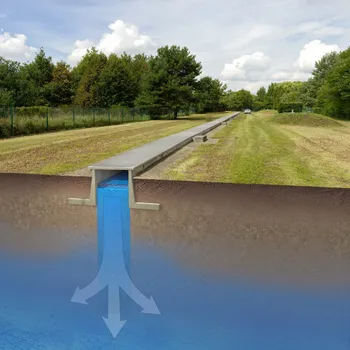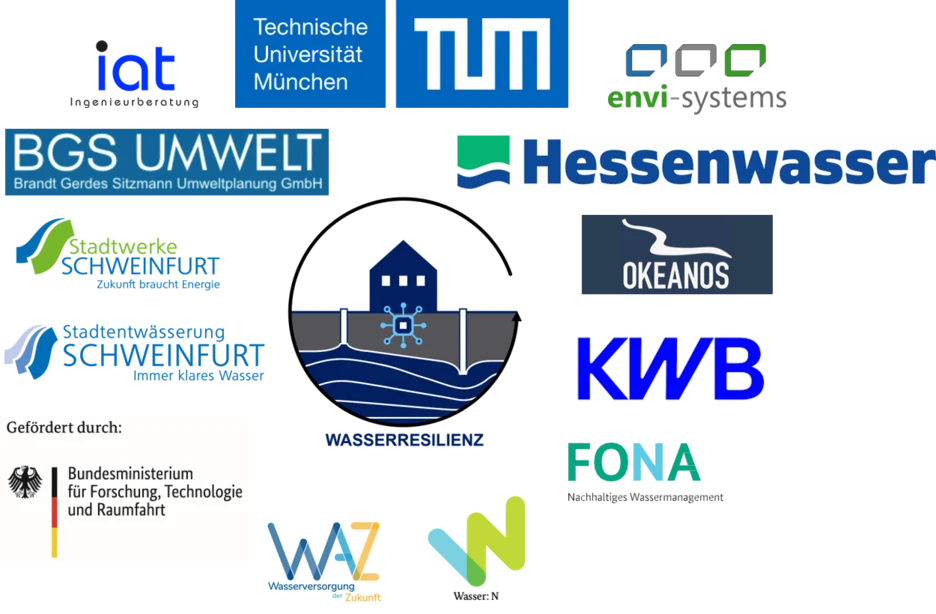Water resilience - Innovative management and operating concepts for future-proof and resilient water infrastructures
Water supply of the future (WaZ)
Climate change is altering the supply of water, but also the use of water, with increasing speed. The previous assumption of temporal stationarity for planning processes and in water supply no longer applies. The ‘Water Resilience’ project is therefore developing the following dynamic solutions: (i) predictive groundwater management with energy optimization based on artificial intelligence (AI); (ii) proactive well operation to improve raw water quality in bank filtration and (iii) integrated management of reclaimed water, an alternative water resource for nonpotable purposes in urban and rural areas, in order to conserve drinking water resources. The increase in resilience through the solutions will be evaluated and the transferability of the solutions to other locations will be specifically promoted.
Instationarity is the new normal
Until the beginning of this millennium, water management systems were characterized by the assumption of stationarity (i.e. fluctuations were within a historically established range of experience), which previously allowed resources and technical facilities to be managed in a largely constant planning window over long periods of time. The effects of climate change are eroding this assumption: extreme events such as heavy rainfall with extreme flooding and prolonged dry periods and droughts are becoming more frequent and more severe. At the same time, water quality is deteriorating. This increases planning uncertainty for water suppliers and planning engineering offices. In addition, the demand for water from households, for industrial cooling water purposes and for agricultural irrigation is increasing (sharply). This fundamental change in supply and demand poses major challenges for the planning and operation of water supply and infrastructure. In order to meet the new quality of the challenges (non-stationarity, growing uncertainties, multiple exacerbations), the resilience of the entire water supply infrastructure needs to be increased through accelerated, effective and economically viable adaptation strategies. Only planning and operations that are prospective, quickly adaptable, flexible and system-wide, and that consider relevant forecasts of supply and demand, will be able to guarantee security of supply until 2050 and beyond.
Forward-looking solutions and resilient structures are required
In two case studies (1) Rhine-Main / Frankfurt and (2) Main / Schweinfurt, innovative management and operating concepts for future-proof and resilient water infrastructures are being developed and will be integrated into real-life operations. As a basis for the development of the solutions, current and future water availability, quality and demand will be determined and made available to the project partners via a database for the development of management and operating concepts. The water supply of the Frankfurt metropolitan region in the Rhine-Main area (1) is largely provided by the Hessian Ried, where targeted groundwater recharge with clear management objectives guarantee the required quantities of water. In the project, the long-term groundwater data and simulations are used as a "learning area" for artificial intelligence (AI). This AI application is to be developed as an assistance system optimizing groundwater management in conjunction with load management in plant operation, which promises enormous energy savings through the systematic linking of groundwater recharge, well operation and water treatment.
In the Main (case study 2), there are pronounced seasonal low flow phases with noticeable effects on the water quality in the river. Representative concepts for proactive well operation are therefore being developed for the bank filtration system of the city of Schweinfurt, which continue to ensure the best possible raw water quality in the extraction wells during low flow phases of the Main. Proactive well operation is used to temporarily shield the river-side groundwater and temporarily increase the land-side inflow. In addition, alternative water resources (so-called reclaimed water and collected rainwater) are integrated into the planning of climate-resilient structures in the city of Schweinfurt and the surrounding area. In this way, the alternative water resources supplement the water supply for applications where drinking water quality is not required, such as fire-fighting water or for the irrigation of urban green spaces and agricultural areas, and thus contribute to a diversification of the water supply.
Actively shaping change and disseminating best practices
The aim of the Water Resilience project is to transfer, adapt and apply the findings and best practices of the integrated water resource concept for nonpotable water to the Frankfurt metropolitan region and other cities. In addition to recording the costs and environmental impacts of the solutions, quantitative assessment measures for the resilience and adaptability of the entire water supply infrastructure will also be developed as part of this project and applied in the case studies. These enable a well-founded comparison of proposed solutions with the status quo on the strategic planning horizon of 2050, so that we can make our water supply infrastructures more resilient in the upcoming investment cycle!
| Project leader | |
| Researcher | Philipp Gigla, M.Sc. |
| Collaboration | Technische Universität München, Lehrstuhl für Siedlungswasserwirtschaft (TUM) |
| Funding | BMFTR |
| Duration | until 29.02.2028 |
| Projektträger | Projektträger Karlsruhe |
| Funding ID | 02WAZ1748A |
The Federal Ministry of Research, Space and Technology (BMFTR) is funding the „Innovative Management- und Betriebskonzepte für zukunftssichere und resiliente Wasserinfrastrukturen (Wasserresilienz)“ project within the „Wasserversorgung der Zukunft“ funding measure as part of the federal research program on water “Wasser: N”. Wasser: N contributes to the BMFTR “Research for Sustainability (FONA)” Strategy.

